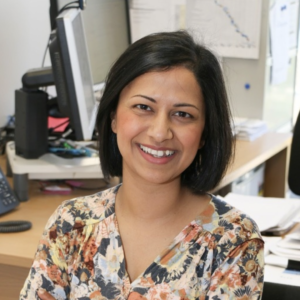Read our Q&A with Sam Chakraborty, Primary & Chronic Care Panel Methods Chair:
 Please tell us about yourself and your role with the Taskforce
Please tell us about yourself and your role with the Taskforce
I’m Samantha Chakraborty. My background has been in guideline development and implementation, predominantly in the primary care setting. I joined the Taskforce in April 2020, in the role of Senior Evidence Officer. I have since commenced as Methods Chair of the Primary and Chronic Care Panel. This panel develops recommendations for people with COVID-19 who are receiving care in the community as well as recommendations for care following acute-COVID-19.
Describe your education/career pathway.
I have always been interested in how people make decisions to provide high-quality care and have taken an unconventional combination of academic and non-academic roles over my career.
Following my lab-based PhD in neuroscience, which was an excellent foundation in scientific methods, I moved outside academia to work with the RACGP and Beyond Blue, in research management roles. Over the past 10 years I have had mostly academic roles focusing on developing clinical guidelines and implementing these guidelines in general practice. These roles have involved undertaking mixed-methods research, designing and running trials, developing ongoing relationships with consumers and other stakeholders, working with policy makers and methodological expertise in developing usable high quality guidelines.
If you could choose just one thing in your role to do everyday, what would it be and why?
I love having a role that is challenging and rewarding in many ways. The one thing that I would choose to do every day is to connect with my team. In a program such as the Taskforce, which is so fast-paced and has many moving parts, I appreciate the ability to connect with members of the team, and wider research and policy and healthcare communities regularly to ensure that our work is on track, meeting expectations and being useful.
What piece of advice would you give to a young student beginning their studies in a similar field?
When thinking about your career goals, some people have a clear idea of the role that they would like to strive towards. If you don’t, that’s ok. It is just as important to have a clear idea of your goal (or area in life where you want to make a difference). The ideal role for you might not even exist right now.
You were recently in Oxford, can you tell us a bit about your experience?
I was at the Oxford International Primary Care Research Leadership Programme. This was a wonderful opportunity to reflect on my strengths as a leader in primary care research as well as develop (very importantly) awareness of areas for improvement. The course also enabled me to get to know some fantastic primary care research leaders from around the world. The programme is coordinated by a team with a very generous spirit. This is evidenced in the variety of excellent content, covering many aspects of leadership, range of formats including time for reflections and master classes to elaborate on concepts and learnings, and social time.
What was it like travelling overseas for the first time since the pandemic? (for all those who are yet to experience it again!)
Travelling is wonderful. I was most surprised at how much I had missed seeing different people, cultures and ways of life. The adventure really began at the airport and then continued as I landed in London. I had also forgotten how challenging a long-haul flight can be :). I am not sure if this reflection is because I have previously been to London, but I also felt an unexpected affinity with everyone else who was travelling and who I met, knowing that we had all gone through the COVID-19 experience together, no matter where we were in the world.
Currently, you’re working in a space with very little data (Long COVID). How do you approach the unknowns of such a prevalent topic?
This is certainly a challenging task. There is little data about what treatment approaches work for whom but there is a lot and every growing data about experiences of long COVID – a quick search on Pubmed just now produced over 25,000 papers!
This makes the task challenging because patients and clinicians are seeking evidence-based advice. At the same time, our understanding of the underlying mechanisms of the illness and potential differences between symptoms are evolving rapidly.
Our advice for management has to date been based on expert consensus and urges clinicians to provide patient-centred care using their clinical expertise for symptoms or exacerbated chronic diseases. We hope to see more specifically-targeted RCTs published in the near future.
What does your dream career milestone look like?
I judge my career milestones in three ways:
1) Am I making a difference? I like to work on projects that have a tangible impact and I enjoy recording this impact e.g. (Taskforce NHMRC Case Study)
2) Am I growing capacity? I feel proud of my team when they succeed in their careers; and
3) I would love to be leading a team that undertakes and uses relevant research to facilitate person-centred evidence-based care.
How do you unwind after a week of work?
I love spending time in nature and with family. My go-to are walks or bike rides in the park, time in the garden, or driving into the mountains for a hike.
What is the hardest thing you’ve done in your career, but wouldn’t change if you could?
Although my favourite thing is to work with people, the hardest thing to do is have challenging conversations with people. Early in my career I would shy from these but I have learned that the problem doesn’t usually go away on its own so it is best to address these issues with kindness, sensitivity and facts. This usually leads to a better outcome for everyone involved.